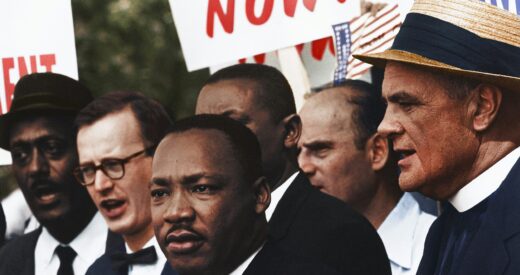For many, talking about racism, along with politics and religion, has been an area particularly tricky to negotiate in the workplace. Many companies have unspoken rules about topics like these being off-limits for their management and employees. While, at first, this may seem like a safe play for everyone involved, over time, company culture may suffer with these policies or unspoken rules in place in an increasingly diverse workplace corresponding with often increasing societal tensions.
According to a recent report from the Society for Human Resource Management, the leading association for human resource professionals in the United States, there are disparities in how safe workers feel about discussing race in their offices, warehouses, and manufacturing floor environments. Almost half of Black professionals think that race is an unsafe topic at work, while only a little over a quarter of White professionals express a similar concern.
To create more inclusive spaces at work, we must embrace a new framework where people can speak freely on issues of race, without fear of negative consequences or retribution. Furthermore, companies must embrace anti-racist stances in order to be more equitable, as well as attract and retain a more racially and ethnically diverse talent pool.
Anti-racism is a hallmark concept of creating a more racially inclusive environment for all. What does it mean to be anti-racist? In short, being anti-racist isn’t a philosophy rooted in White transgression, nor is it focused on a particular endgame of expressing White guilt or apologizing for the wrongs experienced by Black people.
Rather, it’s a mindset: a process defined by both reflection and progress, with hard work to be done by people of all racial and ethnic backgrounds. Being anti-racist means questioning policies, structures, and ways of doing business that may explicitly or inadvertently promote different outcomes or levels of fairness for those representing different groups.
In a society that’s increasingly polarized along partisan political lines, where party politics can often feel like a team sport or part of our individual identities, it’s important to keep our workplaces productive and focused on what we can do to create better equity along racial lines without alienating our colleagues who may have different political perspectives.
Here are some ways that companies can implement an anti-racist culture initiative without wading into the charged waters of politics.
Leaders Set the Example
As with virtually any aspect of company culture, leaders set the tone for anti-racism as a process. According to anti-racism educator and DEI consultant Janice Gassam Asare, leaders have an obligation to create environments where everyone can speak freely and without fear of repercussion on the subject of race. The process of anti-racism can’t be solely thought of nor positioned simply as a human resources exercise. By being proactive before these topics of discussion inevitably arise, leaders can set the ground rules for employee dialogue by being open to these conversations themselves. As they create open spaces for dialogue, leaders must set the table not only for employees of color to not be labeled as activists but also for their White counterparts to not be labeled as fragile.
We All Embrace the Process
In order to achieve cultures defined by anti-racism, workplace teams must fully realize that anti-racism is not an end-point but a practice. Any DEI consultant will tell you that DEI work is hard, and it takes time. Thus, we have to give each other space to operate within DEI frameworks like anti-racism and allow people to grow at their own pace throughout the process.
Lisa Brown Alexander, CEO of Nonprofit HR, points out that most of our beliefs held as individuals with regard to race are often socialized over many years and therefore take significant time to unpack and change our perspectives. Her central argument is that everyone interested in building a business together must show the same tenacity for understanding differences and coming together on race as they do for other aspects of collaboration and respectful behavior in order to build the company as a team. Very few of us in the modern workplace are experts in anti-racism. The sooner we all admit we are at (near square one as anti-racists), the better off we will be as a team.
Focus on Accountability Without Burdening ERGs
Many companies equip their DEI programs for progress through employee resource groups (ERGs) – affinity groups created by and for various segments of their workforce. However, some leaders may fall into the trap of thinking ERGs are a fix for policy shortcomings or the only vehicle for workplace dialogue on issues like race. As participants in DEI strategy, ERG efforts should be additive, not foundational.
According to Bob Conlin, CEO of the risk and compliance consulting firm NAVEX, burdening ERGs may, in fact, worsen the tension on discussions of race, since they often include only people of color and declared allies. Instead, Conlin posits, everyone must be accountable to a culture of speaking up. While ERGs certainly solve many workplace challenges, particularly in creating safe spaces for people with shared backgrounds or experiences, anti-racism should be programmed across the organization, with everyone accountable to a stated desire and commitment at the top level to realize an anti-racist culture.
If You Need It, Get Help
As we all try to embrace cultures of inclusion and create workplaces that promote fair access to opportunities to work, achieve, and lead, it’s important to know our own limitations. Bringing in a third party can help you facilitate frank, safe discussions and navigate uncomfortable moments to be sure that productive conversations on race – no matter how emotional, vulnerable, or passionate – don’t devolve into political arguments. Strong leadership, along with education in anti-racist principles and ways of approching situations, policies, and the unspoken dos and don’ts of a culture, can help us all transcend political discussion and focus on what matters to us as colleagues, friends, and people.
Politics is often about exploiting our differences. Anti-racism is ultimately about understanding these differences and finding consensus on what can make us more effective as individuals and teams.
With an academic background in literature and linguistics, Roxanne Bellamy, CDE, loves exploring the intersection between the words we choose and the way we see the world.






